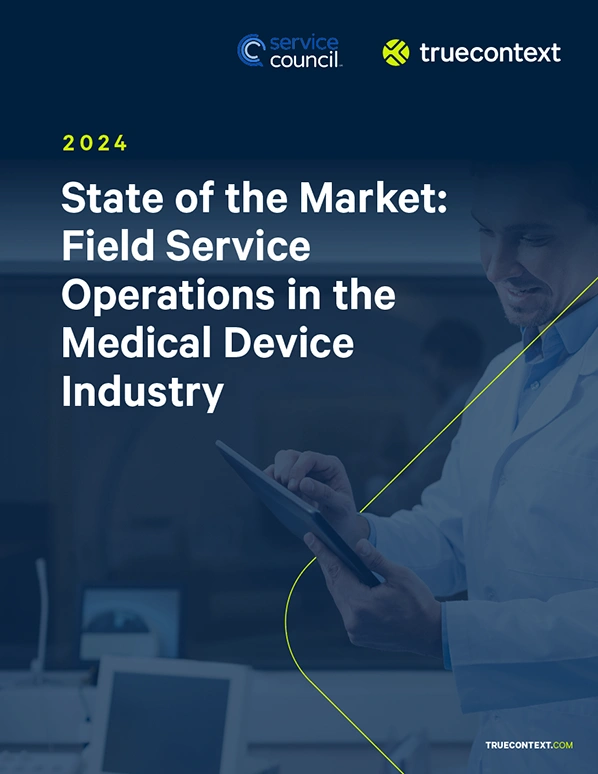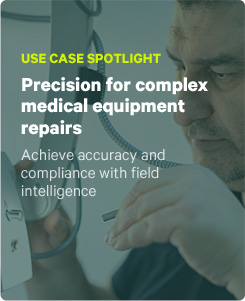Leveraging AI, improved first-time fix rates, and an engaged workforce for success
In the rapidly evolving medical device industry, knowledge management is emerging as a critical tool that can provide companies with a competitive edge. Field service operations have become more complex, driven by the increasing sophistication of medical devices and the ever-changing regulatory environment. As such, efficiently managing and deploying knowledge across service teams is no longer optional—it is essential for companies to remain competitive.
Knowledge Management: The Industry Imperative
According to data from our State of the Market: Field Service Operations in the Medical Device Industry report, over 67% of organizations reported that managing institutional knowledge is one of their top challenges. This statistic underscores the growing importance of knowledge management in an industry where field service engineers (FSEs) are expected to deal with increasingly complex devices.
Medical devices have become more advanced, incorporating features such as artificial intelligence, network connectivity, and software integrations, which require FSEs to have specialized knowledge to provide effective service. For companies to maintain high service levels, it is crucial that knowledge is not only captured but also readily accessible to FSEs in the field. The ability to tap into a comprehensive knowledge base in real-time can significantly enhance the efficiency and effectiveness of service delivery.
The Challenge of Knowledge Retention
Another key insight from the report reveals that 56% of companies are facing significant challenges in retaining institutional knowledge, especially with the aging workforce. The medical device industry is grappling with the reality that a significant portion of its skilled labor is nearing retirement. This “silver tsunami” threatens to create a knowledge gap, as seasoned FSEs take years of accumulated expertise with them when they leave the workforce.
The impact of this loss is twofold: not only does it create operational inefficiencies, but it also puts companies at risk of falling behind in an industry where knowledge is a critical asset. This challenge has made the creation and maintenance of a robust knowledge management system one of the primary concerns for field service leaders.
Leveraging Technology for Knowledge Sharing
The report highlights that 72% of organizations are investing in digital tools to better manage and share knowledge across their field service teams. Digital platforms, such as mobile-enabled knowledge bases, artificial intelligence-driven diagnostic tools, and collaborative software, are enabling companies to address the knowledge retention problem by making institutional knowledge more accessible.
Software solutions, like TrueContext, provide the infrastructure to ensure that knowledge is readily available and can be applied efficiently, supporting FSEs as they navigate intricate procedures, sophisticated assets, and evolving service demands. By facilitating this knowledge exchange, organizations can ensure that their teams stay aligned, productive, and equipped to handle the growing complexity in their field operations.
This kind of software integration allows for real-time access to service manuals, historical maintenance data, and updates on asset conditions. As a result, FSEs can make informed decisions on the spot, reducing downtime and increasing first-time fix rates. In a field where time and precision are critical, having a centralized source for knowledge management and transfer is essential to maintaining operational excellence and ensuring consistent service delivery across teams.
One trend outlined in the report is the increasing use of remote assistance technologies, where FSEs can access a central repository of knowledge or connect with senior experts in real time for guidance during a service call. This capability ensures that even less experienced technicians can tap into the collective knowledge of the organization, reducing the learning curve and minimizing downtime for customers.
Moreover, with AI-powered tools, companies can analyze historical service data to predict potential issues before they occur. This not only improves the first-time fix rate but also enables FSEs to become more proactive in their service approach. By anticipating issues, companies can resolve problems more efficiently, which is a major factor in customer satisfaction and retention.
Need more insights?

Download our State of the Market 2024: Medical Device Field Service Report
Leveraging Technology for Knowledge Sharing
The report highlights that 72% of organizations are investing in digital tools to better manage and share knowledge across their field service teams. Digital platforms, such as mobile-enabled knowledge bases, artificial intelligence-driven diagnostic tools, and collaborative software, are enabling companies to address the knowledge retention problem by making institutional knowledge more accessible.
Software solutions, like TrueContext, provide the infrastructure to ensure that knowledge is readily available and can be applied efficiently, supporting FSEs as they navigate intricate procedures, sophisticated assets, and evolving service demands. By facilitating this knowledge exchange, organizations can ensure that their teams stay aligned, productive, and equipped to handle the growing complexity in their field operations.
This kind of software integration allows for real-time access to service manuals, historical maintenance data, and updates on asset conditions. As a result, FSEs can make informed decisions on the spot, reducing downtime and increasing first-time fix rates. In a field where time and precision are critical, having a centralized source for knowledge management and transfer is essential to maintaining operational excellence and ensuring consistent service delivery across teams.
One trend outlined in the report is the increasing use of remote assistance technologies, where FSEs can access a central repository of knowledge or connect with senior experts in real time for guidance during a service call. This capability ensures that even less experienced technicians can tap into the collective knowledge of the organization, reducing the learning curve and minimizing downtime for customers.
Moreover, with AI-powered tools, companies can analyze historical service data to predict potential issues before they occur. This not only improves the first-time fix rate but also enables FSEs to become more proactive in their service approach. By anticipating issues, companies can resolve problems more efficiently, which is a major factor in customer satisfaction and retention.
Field Service Training and Upskilling
Given the complexity of modern medical devices, continuous training has become vital for FSEs to stay abreast of technological advancements. According to the report, 64% of companies have identified training as a core focus area to maintain service standards. However, traditional training methods are not sufficient to meet the needs of today’s field service teams.
Companies are increasingly turning to knowledge management systems that incorporate ongoing learning modules. These systems provide FSEs with the tools they need to quickly learn about new products, troubleshoot common issues, and develop the necessary skills to work on more advanced devices. This continuous learning model ensures that companies are not only retaining knowledge but are also upskilling their workforce in real-time.
A Competitive Advantage
From an operational standpoint, the companies that are most successful in the medical device field service space are those that have integrated knowledge management into their overall service strategy. The report suggests that 80% of companies with advanced knowledge management systems in place have seen improvements in their service metrics, including first-time fix rates and customer satisfaction scores.
In addition, organizations that prioritize knowledge management are more likely to excel in outcome-based service models. As the industry shifts towards these models, where customers pay based on the outcomes delivered rather than the services provided, the ability to efficiently manage and deploy knowledge will play a crucial role in meeting contractual obligations and exceeding customer expectations.




